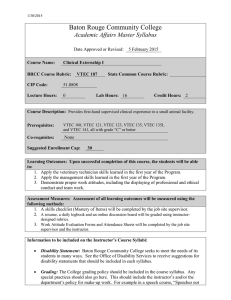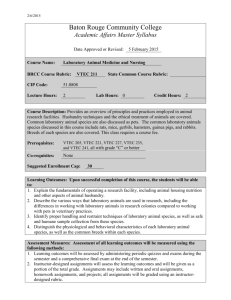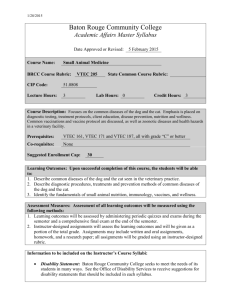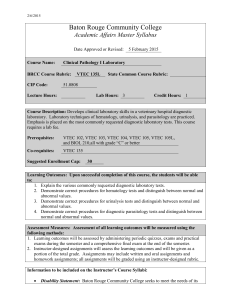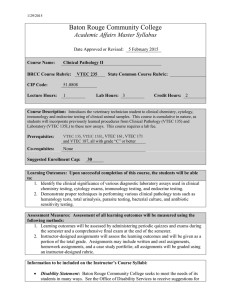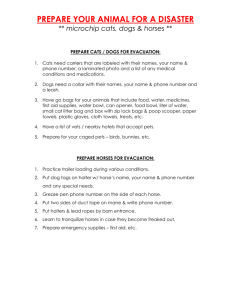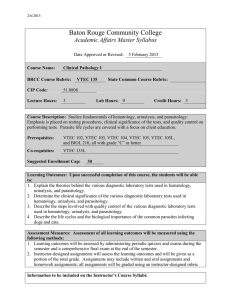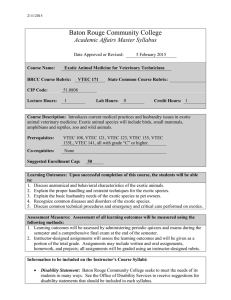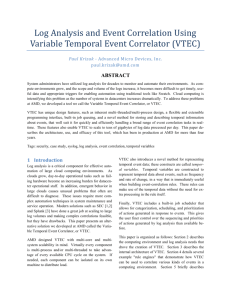VTEC_121_MS
advertisement
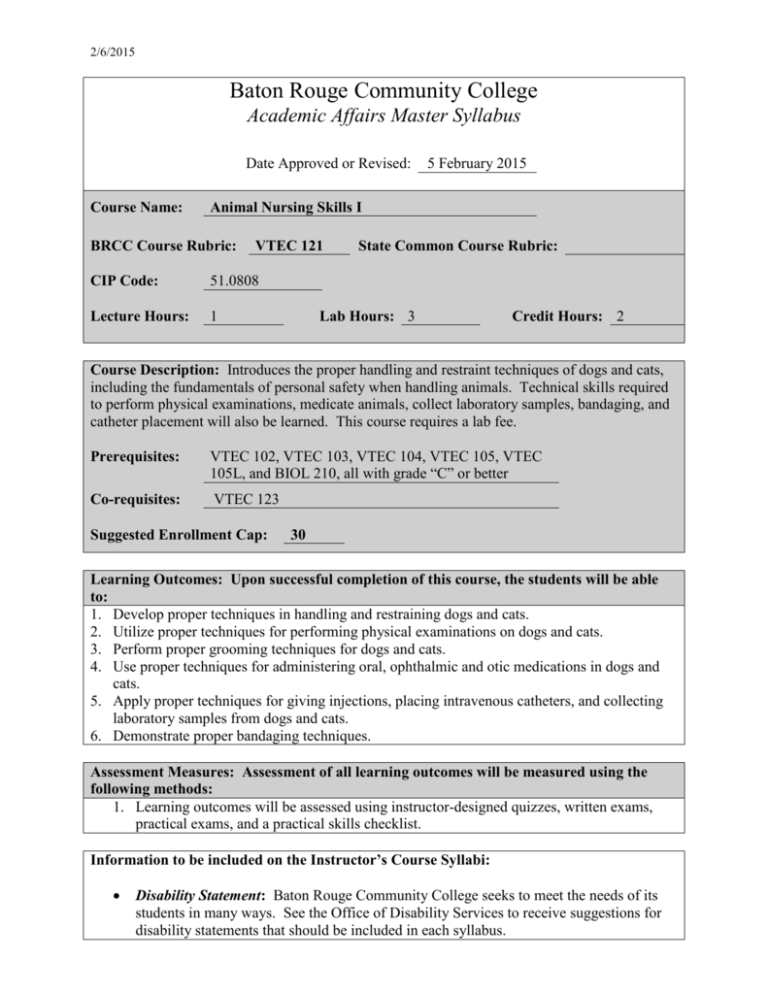
2/6/2015 Baton Rouge Community College Academic Affairs Master Syllabus Date Approved or Revised: Course Name: 5 February 2015 Animal Nursing Skills I BRCC Course Rubric: VTEC 121 CIP Code: 51.0808 Lecture Hours: 1 State Common Course Rubric: Lab Hours: 3 Credit Hours: 2 Course Description: Introduces the proper handling and restraint techniques of dogs and cats, including the fundamentals of personal safety when handling animals. Technical skills required to perform physical examinations, medicate animals, collect laboratory samples, bandaging, and catheter placement will also be learned. This course requires a lab fee. Prerequisites: VTEC 102, VTEC 103, VTEC 104, VTEC 105, VTEC 105L, and BIOL 210, all with grade “C” or better Co-requisites: VTEC 123 Suggested Enrollment Cap: 30 Learning Outcomes: Upon successful completion of this course, the students will be able to: 1. Develop proper techniques in handling and restraining dogs and cats. 2. Utilize proper techniques for performing physical examinations on dogs and cats. 3. Perform proper grooming techniques for dogs and cats. 4. Use proper techniques for administering oral, ophthalmic and otic medications in dogs and cats. 5. Apply proper techniques for giving injections, placing intravenous catheters, and collecting laboratory samples from dogs and cats. 6. Demonstrate proper bandaging techniques. Assessment Measures: Assessment of all learning outcomes will be measured using the following methods: 1. Learning outcomes will be assessed using instructor-designed quizzes, written exams, practical exams, and a practical skills checklist. Information to be included on the Instructor’s Course Syllabi: Disability Statement: Baton Rouge Community College seeks to meet the needs of its students in many ways. See the Office of Disability Services to receive suggestions for disability statements that should be included in each syllabus. Grading: The College grading policy should be included in the course syllabus. Any special practices should also go here. This should include the instructor’s and/or the department’s policy for make-up work. For example in a speech course, “Speeches not given on due date will receive no grade higher than a sixty” or “Make-up work will not be accepted after the last day of class.” Attendance Policy: Include the overall attendance policy of the college. Instructors may want to add additional information in individual syllabi to meet the needs of their courses. General Policies: Instructors’ policy on the use of things such as beepers and cell phones and/or hand held programmable calculators should be covered in this section. Cheating and Plagiarism: This must be included in all syllabi and should include the penalties for incidents in a given class. Students should have a clear idea of what constitutes cheating in a given course. Safety Concerns: In some programs this may be a major issue. For example, “No student will be allowed in the safety lab without safety glasses.” General statements such as, “Items that may be harmful to one’s self or others should not be brought to class.” Library/ Learning Resources: Since the development of the total person is part of our mission, assignments in the library and/or the Learning Resources Center should be included to assist students in enhancing skills and in using resources. Students should be encouraged to use the library for reading enjoyment as part of lifelong learning. Expanded Course Outline: I. Restraint Techniques II. Performing physical examinations III. Grooming care 1) Nails 2) Anal glands IV. Oral medications 1) Tablets 2) Capsules 3) Liquids V. Eye and ear care VI. Injections 1) Subcutaneous 2) Intramuscular 3) Intravenous 4) Intradermal VII. Venipuncture 1) Cephalic 2) Jugular 3) Saphenous VIII. Laboratory sample collection 1) Urine 2 2) Feces IX. Intravenous catheter placement X. Bandaging 1) Tail 2) Paw 3
